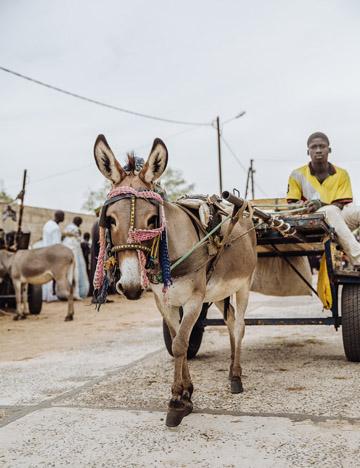Global welfare standards for working equines announced
In a huge milestone for Brooke’s global animal welfare and advocacy work, the World Organisation for Animal Health (OIE) has for the first time announced a set of welfare standards for working horses, donkey and mules.
Brooke has been supporting the OIE in developing the standards over the past three years, providing expertise and technical input. One hundred and eighty countries will commit to undertake the recommendations, which were approved today at the World Assembly of OIE Delegates in Paris.
Standards for animal welfare already exist for other animals such as those used in food production, but until now, working horses, donkeys and mules have been largely overlooked by governments and policy makers.

The standards focus specifically on horses, donkeys and mules. For working equines, the standards set out guidelines on various aspects of their lives to make sure they have good welfare.
Recommendations relate to food and water provision, shelter, prevention and treatment of disease, handling, equipment, behaviour and general workload. They even extend to care at the end of their working lives. Governments all over the world will be responsible for enforcing them alongside the OIE’s other standards for animal welfare.
This opens the door for us to work with governments to implement the standards. This is a big step towards getting working horses, donkeys and mules the attention they deserve, for the role they play in helping millions of people work their way out of poverty.
Karen Reed, Head of Animal Welfare Capacity at Brooke, was one of the key technical experts supporting the OIE whilst they developed the standards. She said;
“These standards represent the missing piece of the puzzle when it comes to animal welfare. At Brooke we often say that the horses, donkeys and mules of the world are the invisible workers, because in terms of their welfare, there is little being done at a government or international level. These standards will help us to change that.”
However, the animal welfare standards will not be law. The next steps are to ensure they are first adopted and understood but then properly implemented in the member countries. Brooke will be supporting governments to do this. Fred Ochieng, Head of Brooke East Africa, will be part of the Kenya Delegation. He welcomed the standards, saying:
“This is indeed a dream come true. Having standards to protect horses and donkeys is long overdue. In many regions in East Africa, unless a donkey goes to work a family may not have any food to eat, a kid may not go to school or a pregnant lady may not have access to clinical services. Here, when you sit down to breakfast each morning, the bread or the coffee you have has probably at some point been transported by a working horse or donkey. That is how useful these animals are, and the reason why we must all care and protect them. The standards will help us do more for the animals.”
Petra Ingram, Chief executive of Brooke said:
“I’m very proud of the team – this is a major success which clearly demonstrates Brooke’s global reach. The collaboration with OIE means that we can positively impact animals even in countries where we’re not physically on the ground.
“This opens the door for us to work with governments to implement the standards. This is a big step towards getting working horses, donkeys and mules the attention they deserve, for the role they play in helping millions of people work their way out of poverty.”
- Read the full set of standards on the OIE website.
- Find out more about Brooke’s advocacy work.
- For interviews and images email the Media Team or call 020 7653 5843.
- Find out more about Brooke.
